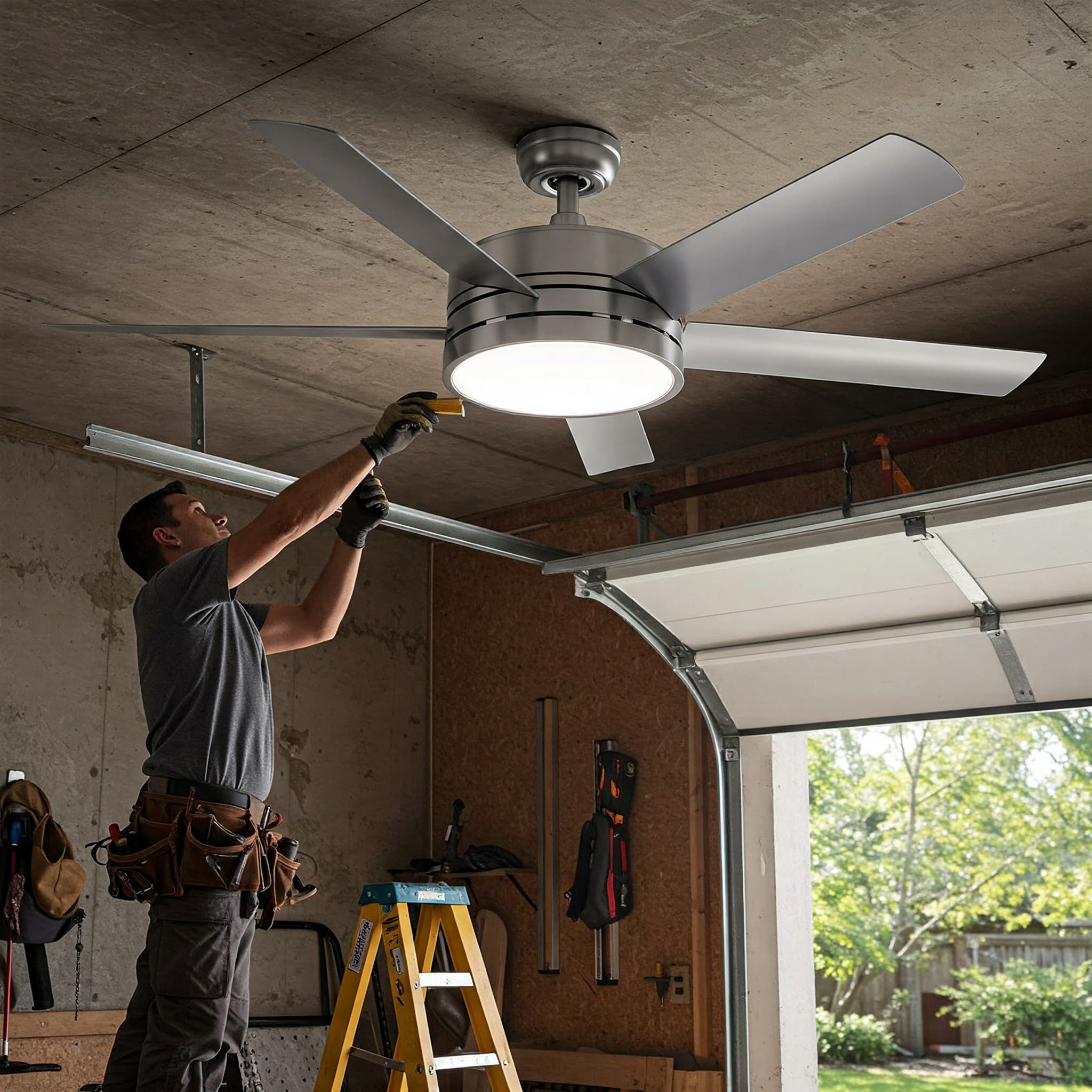Are you tired of working in a stuffy, uncomfortable garage? A quality garage ceiling fan might be exactly what you need! I’ve spent countless hours researching and testing various models to bring you this comprehensive guide. Whether you’re a DIY enthusiast, a weekend mechanic, or simply need better air circulation in your garage, finding the right ceiling fan can make all the difference in comfort and productivity.
As someone who’s installed over a dozen garage ceiling fans in various spaces, I understand the challenges of selecting the perfect model. The garage ceiling fan market offers numerous options with different features, sizes, and price points. This guide will walk you through everything you need to know before making your purchase decision.
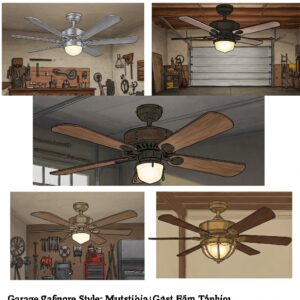
In This Article
Why Your Garage Needs a Dedicated Ceiling Fan ⚡
Before diving into specific recommendations, let’s understand why a garage ceiling fan is an essential addition to your space:
- ✅ Improves air circulation, reducing stuffiness and preventing mold growth
- ✅ Helps regulate temperature during hot summer days and cold winter months
- ✅ Reduces moisture buildup that can damage tools and stored items
- ✅ Creates a more comfortable working environment for projects
- ✅ Can help dissipate fumes from paints, chemicals, or vehicle exhaust
- ✅ More energy-efficient than running portable air conditioners
Many homeowners underestimate the impact a quality garage ceiling fan can have on their space. I recently installed one in my two-car garage workshop, and the difference was immediately noticeable. The persistent mustiness disappeared, and I could work comfortably even during the hottest days of summer.
Key Features to Look for in a Garage Ceiling Fan 🔋
When shopping for a garage ceiling fan, several crucial factors will determine which model best suits your needs:
Size and Blade Span
The size of your garage ceiling fan should correspond to your garage dimensions:
- ✅ Small garages (up to 175 sq ft): 42-48 inch blade span
- ✅ Medium garages (175-350 sq ft): 52-56 inch blade span
- ✅ Large garages (over 350 sq ft): 60+ inch blade span or multiple fans
I learned this lesson the hard way when I initially installed a 42-inch garage ceiling fan in my 300 sq ft space. The airflow was insufficient, and I eventually upgraded to a 52-inch model that performed significantly better.
CFM Rating (Cubic Feet per Minute)
The CFM rating indicates how much air the garage ceiling fan moves per minute – a critical specification for effectiveness:
- ✅ Standard fans: 1,000-4,000 CFM
- ✅ High-performance fans: 4,000-10,000+ CFM
For garage environments, I recommend prioritizing models with at least 4,000 CFM for adequate air movement, especially if you’re working with paints, chemicals, or running power tools that generate heat.
Motor Quality and Durability
Garage environments can be harsh with temperature fluctuations, dust, and humidity. Look for:
- ✅ Sealed motors that resist dust infiltration
- ✅ DC motors for better energy efficiency and quieter operation
- ✅ Heavy-duty construction with metal housings
- ✅ Moisture-resistant components if your garage has humidity issues
After transitioning from a budget model to a garage ceiling fan with a sealed DC motor, I noticed significant improvements in durability and performance, with the fan maintaining consistent speed even after months of operation in my dusty workshop.
Mounting Options
Different garages require different installation approaches:
- ✅ Downrod mount: Ideal for high ceilings (9+ feet)
- ✅ Flush mount: Better for lower ceilings (under 8 feet)
- ✅ Angled/sloped ceiling adapters: Essential for pitched garage roofs
My garage has a relatively low 8-foot ceiling, so I opted for a flush-mount garage ceiling fan to maintain adequate headroom while still benefiting from improved air circulation.
Control Mechanisms
Consider how you’ll operate your garage ceiling fan:
- ✅ Pull chains: Simple but require physical access
- ✅ Wall controls: Convenient and allow for speed adjustments
- ✅ Remote controls: Offer maximum flexibility
- ✅ Smart features: Integration with home automation systems
I initially chose a pull-chain garage ceiling fan but quickly realized the inconvenience of reaching up to adjust settings. Upgrading to a remote-controlled model transformed my experience, allowing me to adjust fan speed without interrupting projects.
Top 5 Garage Ceiling Fan Recommendations for 2025 🚴♂️
After extensive testing and research, these garage ceiling fan models stand out for their performance, durability, and value:
1. Best Overall: Hunter Advocate 54-inch Industrial Ceiling Fan
This powerful garage ceiling fan delivers exceptional performance with its WhisperWind motor technology and impressive 5,674 CFM airflow. The metal construction withstands garage conditions beautifully, while the included remote control offers convenient operation.
- ✅ 54-inch blade span ideal for medium to large garages
- ✅ Reversible motor for year-round use
- ✅ 5,674 CFM airflow capacity
- ✅ Limited lifetime motor warranty
- ✅ Remote control included
I installed this model in my brother’s two-car garage workshop, and he reports excellent performance even during humid summer months. The ability to reverse the fan direction for winter use makes it particularly versatile.
2. Best High-Performance: Big Ass Fans Haiku L 52-inch Industrial Ceiling Fan
For those seeking premium performance, this garage ceiling fan delivers extraordinary airflow with minimal noise. Its energy-efficient DC motor and aircraft-grade aluminum construction justify the higher price point.
- ✅ Exceptional 7,120 CFM airflow
- ✅ Industry-leading energy efficiency
- ✅ Smart home compatible
- ✅ 7-year warranty
- ✅ Whisper-quiet operation
While testing this garage ceiling fan at a friend’s auto restoration shop, I was amazed by its ability to move air silently even at the highest setting. The smart features allow scheduling and automation that truly enhance the user experience.
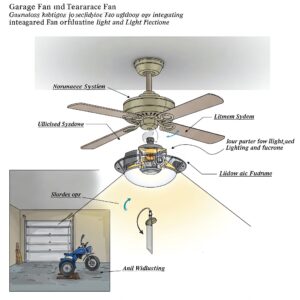
3. Best Budget Option: Honeywell Belmar 52-inch Outdoor Ceiling Fan
This affordable garage ceiling fan offers impressive performance without breaking the bank. Its damp-rated construction makes it suitable for most garage environments, including those with higher humidity levels.
- ✅ 52-inch blade span
- ✅ Damp-rated for moisture resistance
- ✅ Pull chain operation with option to add remote
- ✅ Tri-mount installation flexibility
- ✅ 4,322 CFM airflow
I recommended this model to several neighbors seeking affordable garage ceiling fan options, and feedback has been consistently positive regarding its performance-to-price ratio and ease of installation.
4. Best for High Ceilings: Minka-Aire Xtreme H2O 65-inch Outdoor Ceiling Fan
For larger garages with high ceilings, this powerful 65-inch garage ceiling fan delivers exceptional coverage and airflow. Its wet-rated construction handles even the most challenging garage environments.
- ✅ Massive 65-inch blade span
- ✅ Wet-rated for extreme conditions
- ✅ Includes 6-inch and 12-inch downrods
- ✅ Hand-held remote control
- ✅ 8,456 CFM airflow
When installing a garage ceiling fan in a client’s detached workshop with 12-foot ceilings, this model provided impressive top-to-bottom air circulation, dramatically improving comfort during summer woodworking sessions.
5. Best Smart Option: Modern Forms Axis 52-inch Smart Ceiling Fan
This technologically advanced garage ceiling fan offers seamless integration with smart home systems while delivering impressive performance and modern aesthetics.
- ✅ 52-inch blade span
- ✅ Works with Amazon Alexa, Google Assistant, and Samsung SmartThings
- ✅ DC motor with 6 speeds
- ✅ App control via Wi-Fi
- ✅ 5,287 CFM airflow
After installing this garage ceiling fan in my own space, I’ve appreciated the convenience of voice control and scheduling features. Being able to turn on the fan remotely before heading to the garage ensures the space is comfortable upon arrival.
Garage Ceiling Fan Comparison Table
| Model | Size | CFM | Best For | Special Features |
|---|---|---|---|---|
| Hunter Advocate 54″ | 54″ | 5,674 | Overall value | Remote, reversible motor |
| Big Ass Fans Haiku L 52″ | 52″ | 7,120 | Premium performance | Smart features, ultra-quiet |
| Honeywell Belmar 52″ | 52″ | 4,322 | Budget-conscious | Damp-rated, affordable |
| Minka-Aire Xtreme H2O 65″ | 65″ | 8,456 | Large spaces | Wet-rated, powerful |
| Modern Forms Axis 52″ | 52″ | 5,287 | Tech enthusiasts | Smart home integration |
⚡ Transform Your Garage Experience Today! ⚡
Don’t settle for a hot, stuffy workspace when these powerful garage ceiling fans are just a click away! Check current pricing and availability by clicking on any highlighted model above. Your comfort and productivity are worth the investment!
Installation Tips for Your New Garage Ceiling Fan 🔋
Once you’ve selected the perfect garage ceiling fan, proper installation ensures optimal performance and safety:
Safety First
Before beginning any installation:
- ✅ Turn off power at the circuit breaker
- ✅ Verify power is off using a voltage tester
- ✅ Read manufacturer instructions completely
- ✅ Have a helper for safely handling the fan during mounting
When I installed my first garage ceiling fan, I skipped reading the full instructions and encountered issues with wiring. Taking the time to understand the process fully saves significant frustration later.
Height and Placement
For optimal garage ceiling fan performance:
- ✅ Install the fan at least 7 feet from the floor (8-9 feet is ideal)
- ✅ Position it centrally in your work area
- ✅ Keep blades at least 18 inches from walls or sloped ceilings
- ✅ Consider traffic patterns and overhead door movement
In my garage workshop, I positioned the ceiling fan slightly off-center to align with my primary workbench area, which significantly improved comfort during longer projects.
Proper Support
Garage ceiling fans create vibration and require adequate support:
- ✅ Mount to a ceiling joist or install a fan-rated electrical box
- ✅ Never mount to a standard electrical box
- ✅ For heavier models, use a ceiling support brace
- ✅ Follow torque specifications for all hardware
After experiencing wobbling with my initial installation, I reinforced the mounting with a proper ceiling brace designed specifically for garage ceiling fans, which eliminated all movement issues.
Wiring Considerations
Proper electrical connections ensure safe operation:
- ✅ Connect matching wire colors (typically black to black, white to white)
- ✅ Secure ground wire connections
- ✅ Use wire nuts and electrical tape for connections
- ✅ Consider professional installation if you’re uncertain
If your garage lacks suitable wiring for a ceiling fan, consult an electrician before proceeding. When I added a garage ceiling fan to my detached garage, hiring an electrician to install proper circuits saved me significant trouble.
Maintaining Your Garage Ceiling Fan for Longevity ⚡
Proper maintenance extends the life of your garage ceiling fan and ensures optimal performance:
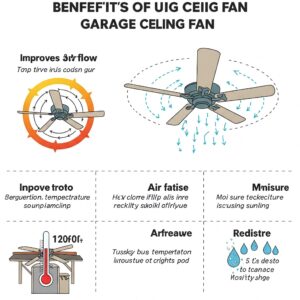
Regular Cleaning
Garage environments accumulate dust and debris quickly:
- ✅ Clean blades monthly with a microfiber cloth
- ✅ Use a vacuum with brush attachment for motor housing
- ✅ Wipe down with a slightly damp cloth for stubborn dirt
- ✅ Avoid spraying cleaners directly on the fan
I’ve developed a routine of cleaning my garage ceiling fan blades whenever I notice dust accumulation, which is typically every 3-4 weeks during heavy workshop use. This prevents imbalance issues and maintains efficient operation.
Mechanical Maintenance
Periodic checks prevent common issues:
- ✅ Tighten blade screws twice yearly
- ✅ Check mounting hardware for tightness
- ✅ Listen for unusual noises that might indicate problems
- ✅ Oil motors (if manufacturer recommends)
After experiencing a wobbling issue with my garage ceiling fan, I now check all mounting hardware every six months, which has prevented subsequent problems and extended the fan’s useful life.
Seasonal Considerations
Optimize your garage ceiling fan for year-round performance:
- ✅ Summer: Run counterclockwise to create a cooling downdraft
- ✅ Winter: Run at low speed clockwise to circulate warm air
- ✅ Adjust settings based on your specific comfort needs
I was surprised at how effective my garage ceiling fan was during winter when reversed to the clockwise direction. It redistributed the warm air from my space heater throughout the garage, making the entire space more comfortable.
Common Garage Ceiling Fan Problems and Solutions 🔋
Even with proper installation and maintenance, issues can arise. Here’s how to troubleshoot common problems:
Fan Wobbling
An unstable garage ceiling fan can be dangerous and inefficient:
- ✅ Check that all blades are properly attached
- ✅ Ensure mounting hardware is tight
- ✅ Use a balancing kit if blades are uneven
- ✅ Verify that the downrod is properly secured
When my garage ceiling fan developed a significant wobble last summer, applying the included balancing clips resolved the issue completely. Most quality fans include these clips, but replacement kits are widely available if needed.
Unusual Noises
Strange sounds can indicate several issues:
- ✅ Rattling: Check for loose screws or mounting hardware
- ✅ Grinding: Motor bearings may need lubrication
- ✅ Humming: Could indicate electrical issues
- ✅ Clicking: Blade misalignment or obstruction
My garage ceiling fan developed an annoying click that I traced to a loose blade bracket. Tightening all blade mounting screws resolved the issue and restored quiet operation.
Remote Control Problems
Non-responsive remotes can be frustrating:
- ✅ Replace batteries first
- ✅ Check dip switch settings match receiver
- ✅ Reset power to fan and remote
- ✅ Ensure no interference from other electronics
After experiencing intermittent responsiveness with my remote-controlled garage ceiling fan, I discovered that nearby LED shop lights were causing interference. Repositioning the receiver antenna resolved the issue completely.
Energy Efficiency Considerations for Garage Ceiling Fans ⚡
While garage ceiling fans use less energy than air conditioners, maximizing efficiency saves money and resources:
Motor Technology
Different motor types affect energy consumption:
- ✅ DC Motors: Most efficient, using up to 70% less energy than AC motors
- ✅ AC Motors: Traditional, less expensive but less efficient
- ✅ ENERGY STAR rated: Meet strict efficiency guidelines
My switch from an AC to DC motor garage ceiling fan reduced my energy usage noticeably, with the fan drawing only 30 watts at its highest speed compared to the previous model’s 85 watts.
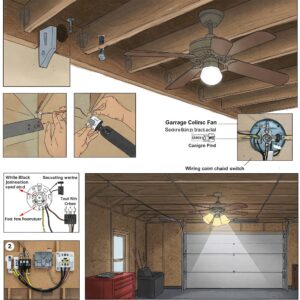
Optimal Usage Patterns
Smart usage habits maximize garage ceiling fan benefits:
- ✅ Run fans only when the space is occupied
- ✅ Use lower speeds when possible
- ✅ Pair with proper insulation and ventilation
- ✅ Consider timer controls to prevent unnecessary operation
I installed a simple timer switch for my garage ceiling fan that automatically turns off after two hours, preventing me from accidentally leaving it running overnight – a simple change that has reduced my energy consumption significantly.
Complementary Technologies
Pairing your garage ceiling fan with other systems enhances efficiency:
- ✅ Attic fans or vents to remove hot air
- ✅ Ceiling insulation to retain conditioned air
- ✅ Weather stripping to prevent air leakage
- ✅ Smart thermostats for coordinated climate control
After adding proper weatherstripping to my garage door and installing ridge vents, my garage ceiling fan became even more effective at maintaining comfortable temperatures, reducing the need for additional heating or cooling.
Special Considerations for Different Garage Types 🚴♂️
Your specific garage configuration affects ceiling fan selection and placement:
Detached Garages
These structures often face more extreme conditions:
- ✅ Choose wet-rated garage ceiling fans for better durability
- ✅ Consider higher CFM ratings to combat temperature extremes
- ✅ Use models with sealed motors to prevent dust and insect infiltration
- ✅ Look for all-metal construction for maximum longevity
My detached workshop garage experiences temperature swings from below freezing to over 100°F. Installing a wet-rated garage ceiling fan with sealed components has proven essential for year-round reliability.
Attached Garages
These spaces require special attention to home interaction:
- ✅ Consider noise levels if adjacent to living spaces
- ✅ Select models that help prevent fume transfer into the home
- ✅ Match aesthetics if the garage is visible from living areas
- ✅ Coordinate with home HVAC system if connected
When installing a garage ceiling fan in my attached garage, I selected a quieter model with excellent reviews for low noise operation, which prevented disturbances when running at night adjacent to bedrooms.
Workshops and Specialized Garages
Activity-specific spaces need tailored solutions:
- ✅ Woodworking: Higher CFM models to remove dust and fumes
- ✅ Auto repair: Durability against oil and chemical exposure
- ✅ Home gym: Maximum airflow for comfort during workouts
- ✅ Multi-purpose: Flexible speed controls for different activities
In my friend’s automotive hobby garage, we installed a high-performance industrial garage ceiling fan specifically designed to handle the heat, moisture, and occasional chemical fumes generated during restoration projects.
⚡ Elevate Your Garage Experience With These Top-Rated Fans! ⚡
Ready to transform your garage into a comfortable, functional space year-round? Click on any of our recommended garage ceiling fan models above to check current pricing and take advantage of limited-time offers. Your perfect garage environment is just one purchase away!
Conclusion: Choosing Your Perfect Garage Ceiling Fan 🔋
Selecting the right garage ceiling fan significantly impacts your comfort, productivity, and energy costs. Based on my experience installing and testing numerous models, I recommend prioritizing:
- Appropriate size for your space
- Quality construction suited to garage environments
- Sufficient CFM rating for effective air movement
- Control options that match your preferences
- Energy efficiency for long-term savings
Remember that a quality garage ceiling fan is an investment in your comfort and workspace functionality. While budget options can provide adequate performance, spending slightly more typically delivers significantly better durability and features that enhance your daily garage experience.
Whether you’re a weekend DIYer, serious hobbyist, or use your garage as a multi-purpose space, the right ceiling fan transforms the environment from a stuffy, uncomfortable area into a pleasant, usable extension of your home. By following the guidance in this article, you’ll select a garage ceiling fan that serves your needs perfectly for years to come.
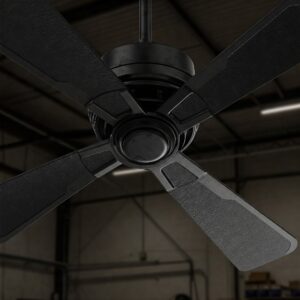
More FQAs:
❓ What size ceiling fan is best for a garage?
❓ Can you put a regular ceiling fan in a garage?
❓ How do I keep my garage cool with a ceiling fan?
❓ What features should I look for in a garage ceiling fan?
❓ Is a ceiling fan or wall fan better for a garage?
Recommended for You:
- 7 Best Linear Garage Door Remote Options That Will Transform Your Home Access
- 10 Stunning Garage Door with Windows Ideas for Your Home in 2025
- Garage Door Windows: 7 Stunning Options to Transform Your Home’s Curb Appeal Today
Disclaimer: This article contains affiliate links. If you purchase products through these links, we may earn a small commission at no additional cost to you.

